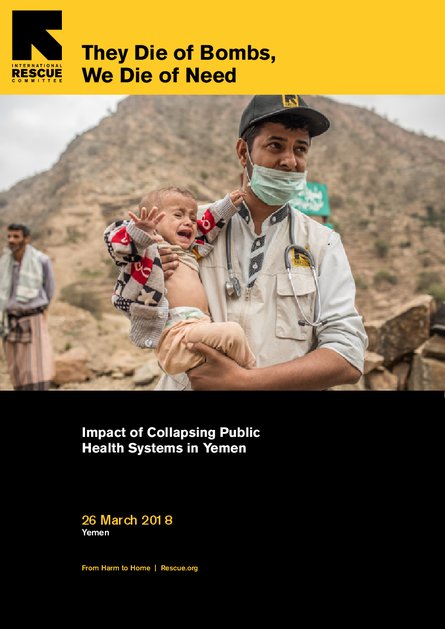
The right to critical life-saving health services of 9.8 million Yemenis caught in the intractable civil war that is in its fourth year has not received adequate policy and media attention leading to a dire humanitarian crisis, especially for mothers and children. While more people have died and continue to suffer starvation and from preventable diseases because of deprivation of basic goods and services than from the actual conduct of war, human rights and humanitarian law violations not directly linked to the conduct of war attracts less attention than those stemming from air strikes and other military action.
The Saudi-led coalition’s (SLC) de facto blockade of the Red Sea ports since Nov. 6, 2017 has led to significant shortages of basic medical supplies for communicable and non-communicable diseases in state-run primary care and emergency medical facilities. The war has further destroyed much of the public water distribution infrastructure, and what remains is in disrepair due to the state’s inability to meet the repair and maintenance cost. Because of the blockade, the cost of water provision has increased significantly due to the rising cost of petroleum needed to pump or deliver water. Parties to the conflict have also depleted the country’s currency reserves. The SLC has not shored up Yemen’s basic public systems even in the south where it has nominal control despite commitments to support the Government of Yemen.
As a result, at least 9.8 million people across Yemen are acutely in need of health services, but only 50 percent of health facilities are operational. The situation is worse in conflict-affected governorates such as Hodeidah, Taizz, Ibb, Hajjah, Amanat al Asimah, and Sa’ada. This has given rise to the largest cholera outbreaks in history, with more than 1 million suspected cases and over 2,000 associated deaths as of January 2018.
At the national level, parties to the conflict must be encouraged to agree to a cessation of hostilities which must include safeguards for health, water and sanitation facilities. In their ongoing inquiry, U.N.’s Eminent Experts on Yemen (appointed by the Human Rights Council in December 2017) should include the targeting of civilian objects including, health, and water and sanitation facilities, with the goal of remedy for victims. At the international level, a new U.N. Security Council resolution is required to enforce IHL by removing humanitarian access impediments and to direct the peace process.
The international community should establish collective humanitarian and development outcomes on the basis of obligations under international human rights law. The Government of Yemen should make public the details of the recently announced national budget (USD 3 billion), with adequate appropriations for public health services, par- ticularly for planned expenditure on salaries for health workers and maintenance of health and water sanitation and facilities. As a part of the internationally led peace process, the Government of Yemen and Ansar Allah authorities should urgently agree to establish a comprehensive national health response plan in partnership with humanitarian and development actors and donors based on humanitarian principles of impartiality and aimed at providing lifesaving services in all governorates.